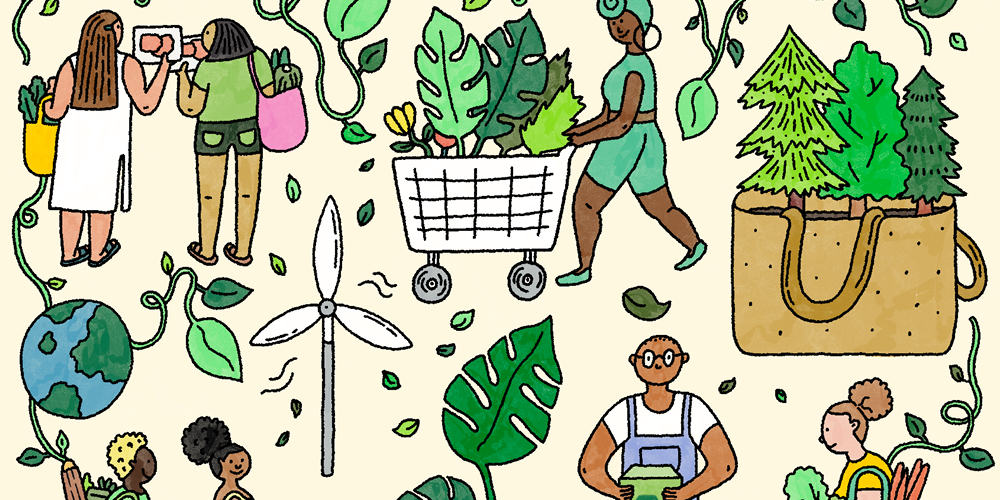Sustainable Shopping: Exploring the Finest Bags for a Greener Future

In today’s world, sustainability has become a pressing concern for individuals and businesses alike. One area where we can make a significant impact is in our shopping habits, particularly the choice of bags we use to carry our purchases. The use of single-use plastic bags has detrimental effects on the environment, leading to pollution, waste, and harm to wildlife. As a result, there has been a growing demand for sustainable alternatives. This article aims to explore the finest bags available for sustainable shopping, providing comprehensive insights into various options that promote a greener future.
The Rise of Sustainable Shopping

Environmental Impact of Single-Use Plastic Bags
- The pollution caused by single-use plastic bags in landfills and oceans.
- The harmful effects on marine life and ecosystems.
- The slow decomposition of plastic bags and their contribution to climate change.
The Call for Sustainable Alternatives
- Increasing consumer awareness and demand for eco-friendly options.
- Government regulations and bans on single-use plastic bags.
- Corporate initiatives towards sustainability.
Evaluating Bag Materials

Cotton and Canvas Bags
- Biodegradability and compostability.
- Reusability and durability.
- Energy and water consumption during production.
- Organic and fair trade options.
Jute and Hemp Bags
- Sustainable cultivation and harvesting practices.
- Biodegradability and compostability.
- Strength, durability, and resistance to wear and tear.
- Environmental impacts of processing and dyeing.
Recycled and Upcycled Bags
- Utilizing post-consumer materials.
- Reducing waste and carbon footprint.
- Creativity and unique designs.
- Limitations and challenges in the recycling process.
Biodegradable and Compostable Bags
- Differentiating between biodegradable and compostable materials.
- Appropriate disposal methods.
- Timeframes for decomposition.
- Balancing functionality and environmental impact.
Alternative Natural Materials
- Bamboo, cork, and wood-based bags.
- Sustainability of sourcing and production.
- Durability and strength.
- Aesthetic appeal and design options.
Functional Considerations
Bag Capacity and Size
- Evaluating the needs for different shopping scenarios.
- Balancing convenience and sustainability.
- Foldable and collapsible options for easy storage.
Carrying Mechanisms
- Tote bags, shoulder bags, and backpacks.
- Ergonomics and comfort.
- Adjustability and versatility.
Additional Features
- Multiple compartments and pockets.
- Closure mechanisms.
- Water and stain resistance.
- Reusability for purposes beyond shopping.
Ethical and Social Considerations
Fair Trade and Ethical Production
- Supporting workers’ rights and fair wages.
- Certification and verification programs.
- Transparency in supply chains.
Local and Artisanal Bags
- Promoting local craftsmanship and traditions.
- Unique designs and cultural heritage.
- Supporting small businesses and communities.
Social and Environmental Initiatives
- Brands that allocate a portion of profits to environmental causes.
- Partnerships with nonprofits and conservation organizations.
- Carbon offset programs.
Popular Brands and Recommendations
Patagonia
- Commitment to sustainability and fair trade.
- Recycled materials and ethical production.
- Diverse range of bags for various needs.
Baggu
- Stylish and functional designs.
- Use of recycled materials.
- Focus on durability and long-term use.
Everlane
- Transparent pricing and ethical production.
- High-quality materials and classic designs.
- Emphasis on reducing waste and carbon footprint.
Reusable Bag Companies
- ChicoBag, Earthwise, and Ecobags.
- Variety of sustainable options.
- Specialized bags for specific purposes (e.g., produce, bulk items).
The Power of Consumer Choice
Educating Yourself and Spreading Awareness
- Understanding the impact of bag choices.
- Sharing knowledge with friends and family.
- Encouraging others to adopt sustainable practices.
Supporting Sustainable Brands
- Researching and selecting responsible companies.
- Advocating for sustainability through purchasing decisions.
- Providing feedback and suggestions to brands.
Conclusion
As the world acknowledges the urgency of environmental preservation, sustainable shopping has emerged as a crucial aspect of reducing our ecological footprint. By opting for the finest eco-friendly bags, we can actively contribute to a greener future. This article has provided a comprehensive overview of various bag materials, functional considerations, ethical aspects, and popular brand recommendations. It is now up to us as consumers to make informed choices, adopt sustainable practices, and inspire others to join the movement. Together, we can transform our shopping habits and pave the way for a more sustainable and responsible future.




Leave a Comment